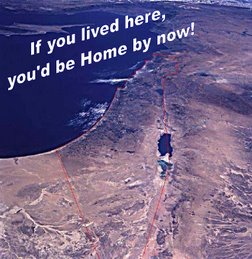I have a relative who is a Christian Missionary, who sometimes comes by my house in the hope that I'm not there (OK, I'm only joking). But hanging around him, as well as observant Christians has given me some insight into how Jews approach the whole G-d idea.
Lori Palatnik, who has a weekly videocast on Aish, one told a story of a seminar she was giving to intermarried couples, one spouse was Jewish, and the other wasn't.
She spoke about a number of topics, where you should educate the kids, how to deal with certain in-laws and other family members, and throughout the seminar she would get nods of heads from different people all over the room. She was trying to see if she could figure out which was the spouse who was Jewish.
She knew when what topic would uncover that answer. As soon as she started speaking about G-d half of the room leaning in (the non-Jewish half) and half of the room leaned back (the Jewish half).
The non-Jews wanted to hear what she had to say, but the Jews didn't. Why?
Back to my uncle, he knows that everything that happens in is life is from G-d, and he acknowledges it. Throughout his speech he'll say, "Through the work of G-d" he recognizes it.
Why don't Jews?
It's not only the non-religious, Orthodox Jews have trouble saying it. Lori, told a story of a woman who approached her after the seminar and told her that she wanted to become Jewish like her husband, but she was worried that if she became Jewish she would have to give up G-d.
Another, similar, subject that revolves around this idea of the Beit Hamikdash. There a rather disturbing story in the Gemarah (Ketubot 61a), of a Jew and a non-Jew who are traveling together. The non-Jew is lagging and he wants the Jew to slow down, so he yells what he thinks is something that will cause the Jew to stop and be shocked. "The Beit Hamikdash has been destroyed."
The Jew turns around and says, "You want to shock me? You're going to have to do better than that, that's old news."
This a great example of what the Exile has done to us. We had a close friend of the family pass away this past summer, and when I went to make a shiva call I realized something. I took a closer look at what we say to the mourner, "May you be comforted with the mourners of Zion and Jerusalem."
What does that mean? It means the feeling you get when you lose someone close to you, is the same feeling you should get when you think about the destruction of the Beit Hamikdash.
I have a rebbe who unfortunetly sometimes has to visit America from Israel. He has some close friends of his who, whenever he's in town, try to get together.
So he's on the phone with one of them and his friend asks him when he's going to to visit America again.
"Well I hope that the next time I see you will be here in Jerusalem in the Holy Temple.
And his friend replied, "Don't be retarded, when are you going to come visit America."
It's a sickness, a sickness of the Exile, and the only thing that will get some people thinking differently will either be a destruction or a rebuilding. The destruction of another Holocaust or the rebuilding of the Beit Hamikdash.
One of the first steps to this is to start realizing G-d more in out lives. Say "Thank G-d," "Baruch Hashem," and don't be afraid. In fact if you say "Thank G-d," to a non-Jew, especially a Christian, they will have the utmost respect for you.
Give it a try, I dare you.
Sunday, November 4, 2007
Subscribe to:
Post Comments (Atom)




No comments:
Post a Comment